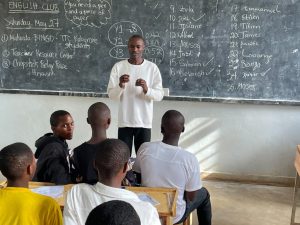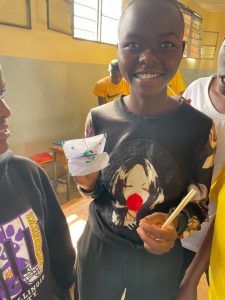Jun 10, 2023
Rwanda marks the beginning of the Genocide Against the Tutsis each year in early April. Since students are on break at that time, the Rwandan government asks schools to hold a commemoration at some point in the following months. It was our turn yesterday. High school and upper primary students from around Kabarore gathered at Bahinga Government School to commemorate the genocide. It was a moving event. There were many speeches by government officials and an Anglican bishop, somber singing and dancing by the students, lighting of candles, and at the end of the ceremony, one woman, a survivor of the 1994 genocide, was given a cow. (In Rwanda, that’s a very valuable gift.) Amazingly, a rainbow appeared during the ceremony despite no rain. While it was a long week and I wasn’t excited to go to the ceremony, it was unbelievably moving and I’m glad I went.
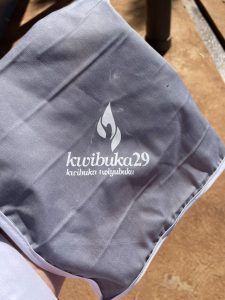
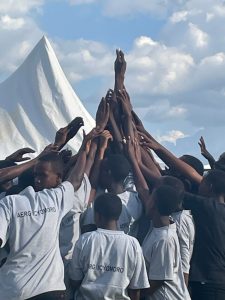
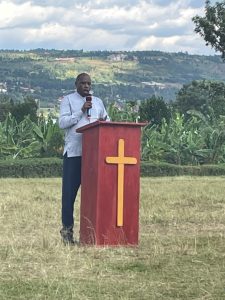
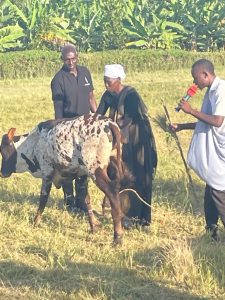
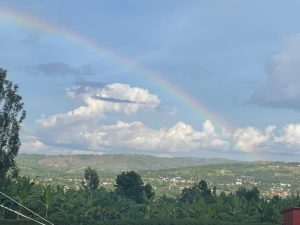
Jun 8, 2023
Some of the students at Kabarore Teacher Training College are refugees from Congo. This is 11th grader Herene who left TTC Kabarore yesterday to return to the refugee camp to get ready to join her father in Kentucky next week. Her journey prompted a lot of discussion in the staff room about refugees in the U.S. A Zimbabwean tutor said that he would like her to continue her education, but I told her it’s more likely that she’ll work and get a high school equivalency diploma. I explained that refugees have to reimburse the U.S. government for the air ticket within 6 months of settling in the U.S. I also pointed out that state education laws differ; if Herene was in New York State, she could continue her education until the year she turned 22, but I’m not sure about Kentucky.
Herene is a great kid and will do fine in the U.S. I gave her the U.S. and Rwandan flags from my bicycle as a going-away present. Good luck, Herene!
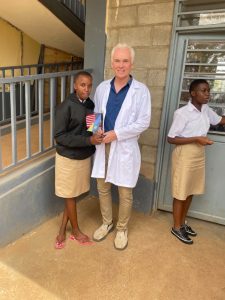
Jun 4, 2023
Here’s today’s slice of life in Kabarore…While there is rain in the forecast for this week, the seasons have changed and it is now the long dry season. Whoever made this pile of bricks waited until the end of the rainy season. Now the sunny and dry weather can harden the bricks. While some houses and buildings are made of oven-fired bricks or cinder blocks, most houses in rural Rwanda are constructed with mud bricks like these, a perfect natural building material. I asked someone if clay is used in the bricks, and he said no, so it appears that they are just mud, dirt, water and discarded parts of plants mixed in to hold the bricks together. The purposes for these bricks are many and perhaps they will be used to build a latrine. Most rural Rwandans use latrines – a hole in the ground with a small mud brick structure built around it for privacy. Luckily, I have an indoor bathroom.
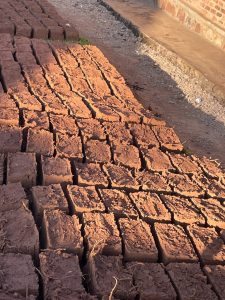
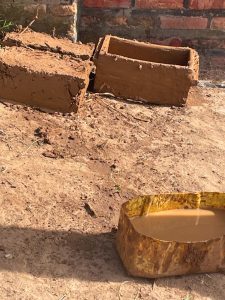
May 31, 2023
Wednesdays are an easy day for me this term – just two classes and they begin after lunch. Since I haven’t had a day off in forever, I lazed around my house in the morning and charged into school around 12:30 to eat lunch and then deliver my classes to 10th graders who are studying Early Childhood & Lower Primary Education. I returned their Unit 7 tests to them and was preparing to have them practice two dialogues, one between a teacher and a parent and the second between a teacher and an administrator about problems with a student. No sooner had I modeled the dialogue with a student when Jean de Dieu, a biology teacher, came and asked if he could borrow my students for 20 minutes to take them outside to do a science experiment with Tutor Alice and Tutor Matara from Zimbabwe. (As you can see, we have no science lab.) 20 minutes turned into 2 hours and there went my class. As this is the end of the semester and school year, I understand that everyone is vying for time with the students to finish the curriculum. As a Peace Corps Volunteer, you learn to let go and not get upset. Personally, I just can’t get mad at Rwandans – they are too nice of people!
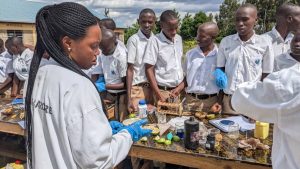
May 28, 2023
Last month, I measured Mr. Manzi against the wall in my house. In typical 7-year-old fashion, for the next two days, he came over put his hand on top of his head and moved it to the wall to see if he had grown any.
Emmanuel, the high schooler who cleans my house, has also picked up ironing duties to make more money. He lives just down the lane about 200m. After he finished ironing my clothes, he asked if he could borrow the iron so that he could iron his clothes. I said sure, and went to put the iron in a bag for him to take home. He said, “Tim, I don’t have electricity at my house.” I had completely forgotten about this.
A couple of weeks ago, I tried to break the news to Manzi that I will be leaving Rwanda soon. Without missing a beat, he said, “And you’re going to bring me back a turtle.” The other day he said that he checked with his father and he can go to the U.S. with me.
Our 11th graders were learning poetic devices yesterday. I asked Emmanuel to express how lovely Alice, the student sitting next to him, was using a simile or metaphor. He thought about it for a bit and said, “Alice is a beautiful as a banana.” She wasn’t happy.
\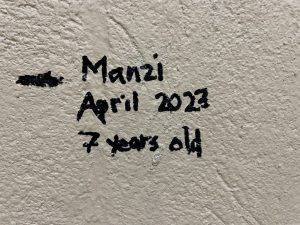
May 27, 2023
One of my duties at Kabarore Teacher Training College is English Club on Saturday afternoons. I share the duty with Tutor Georgina from Zimbabwe. Today was my turn. The students really like to play BINGO, so we play that every week that I run EC. I give every student a “matunda” – passion fruit to play and the winner gets a couple more. I have the students lead the game, with one student acting as teacher and giving the clues. Another activity we did last week was to make fortune tellers and I asked the students how they would use them in the classroom. They had some really clever ideas of how to use them, such as for dialogues, teaching fractions and practice following oral directions. Today I gave the students chopsticks that I bought in Kigali. We played a relay race with them, but a focus was to ask them how they would use them in their classrooms. Again, they had some really clever ideas on using chopsticks to teach math, spelling, music, etc.
